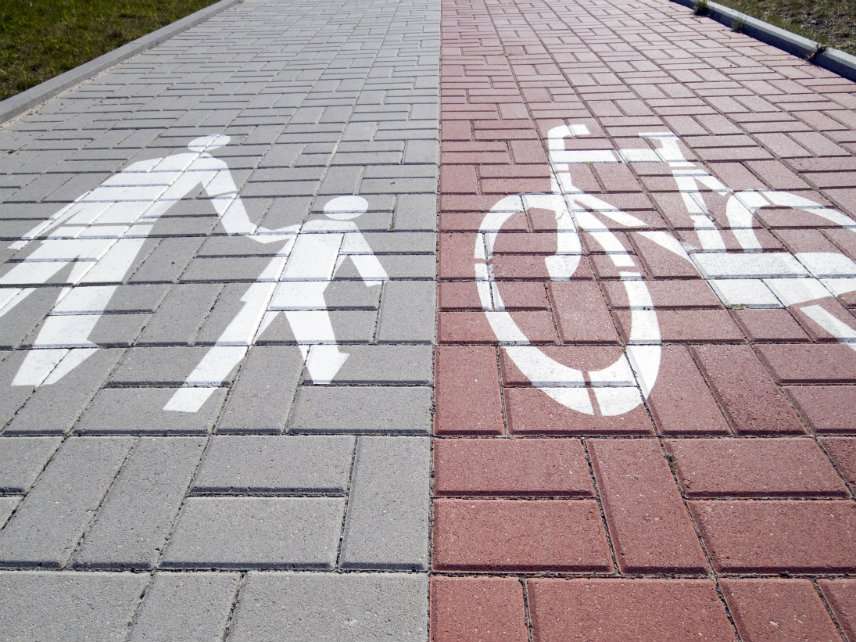The Federal Government's TIGER Program Splurges on Sidewalks in Rural Florida and Recreational Boat Ramps in Iowa
It was supposed to be a temporary stimulus program. Instead it's an engine for pork.

A bipartisan desire to do something big with infrastructure has set off a clash of visions in Washington.
The Trump administration has suggested, in both its budget and its infrastructure proposals, a relatively decentralist approach that would shift some of the financial burden onto states, localities, and private actors, though it would also provide $200 billion in new federal spending. Democrats have countered with demands to preserve and expand the feds' role in infrastructure, demanding anywhere from $1 trillion to $2 trillion in new spending.
Caught in the crosshairs is the Transportation Investments Generating Economic Recovery (TIGER) program, which this past Friday announced $500 million in new grants. The Trump administration has called for killing the program. The Democrats have argued for spending an additional $10 billion on it.
As the name might suggest, TIGER got its start as a part of President Barack Obama's stimulus program. But as the recession faded, TIGER stood firm, spending $5.6 billion in nine round of grants since 2009 on everything from street cars in Portland to streetscaping in Los Angeles.
This year's portfolio of grant awards demonstrates how divorced the program has become from anything of relevance to federal taxpayers.
Among the recipients is the city of Akron, Ohio, which received $8 million to install bike lanes, pedestrian infrastructure, bus shelter enhancements, and traffic calming devices along a 1,700-foot stretch of Main Street. Akron had previously received $5 million in 2016 to do the same thing on a different segment of the same street.
Another lucky winner is Collier County, Florida, which received a $13 million grant for new sidewalks, bike lanes, and landscaping in the 24,000-person town of Immokalee. Burlington, Iowa, will also get new bike lanes, along with parking lot improvements, trees, and recreational boat ramps, all courtesy of $17 million from the feds.
"This was us taking a half-court shot blindfolded and making it," Burlington city planner Charlie Nichols told The Hawk Eye. "It is an unbelievably good deal for downtown Burlington."
That TIGER grants are a good deal for Burlington is not in question. Without the free federal money, city officials would have had to ask their own citizens to foot the bill for these projects. But what exactly taxpayers in Virginia or even Des Moines get from the deal is hard to say.
Indeed, aside from a handful of port and rail improvements, few of this year's TIGER grants can be said to much to do with interstate economic activity or any other truly national purpose.
The only winners at the federal level from these projects seems to be the politicians whose districts stand to benefit. Akron's grant award came with congratulatory press releases from both of Ohio's senators, as well as Akron-area Reps. Tim Ryan and Marcia Fudge.
That aspect of the TIGER grants is not new. A 2012 report by the Reason Foundation, which publishes this website, found that 40 percent of the first two round of TIGER grants went to districts represented by Republicans on the House Transportation and Infrastructure Committee; the four highest-ranking Democrats on the same committee each received at least one TIGER grant apiece. Both Republicans and Democrats in Congress have spoken of the need to preserve the program.
While Trump personally shows little unease with either transactional politics or federal largesse, the members of his administration responsible for writing his infrastructure and budget proposals have other ideas.
Every budget request the White House has submitted to Congress has called for the TIGER grant program to be eliminated, including the Fiscal Year 2019 budget, which says that "using Federal dollars to pay for non-Federal infrastructure projects has created an unhealthy dynamic in which State and local governments delay projects in the hope of receiving Federal funds."
Democrats, contrastingly, have celebrated TIGER explicitly on these grounds, calling the program one of the "few opportunities for local governments to directly secure federal transportation funding" and demanding that its budget be increased by $10 billion.
Free federal money is a hard thing to say no to, so TIGER remains politically popular across both parties. Despite the administration's repeated calls for the program's elimination, the program remains stubbornly safe for now.
Rent Free is a weekly newsletter from Christian Britschgi on urbanism and the fight for less regulation, more housing, more property rights, and more freedom in America's cities.


Show Comments (20)